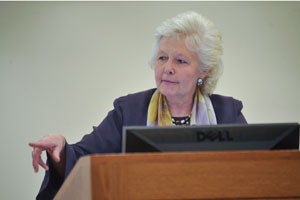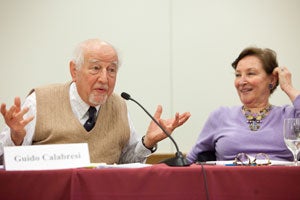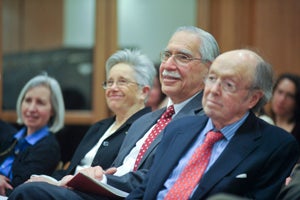An array of luminaries from academia and the bench—and from around the world—came to Harvard Law School to celebrate Professor Frank Michelman ’60 and his influential work, as he prepares to retire after nearly half a century on the HLS faculty.
A symposium in honor of Michelman, Robert Walmsley University Professor, held on Feb. 10 and 11, focused on two of his signal achievements: his comparative constitutional law work, which has involved him in an ongoing dialogue with South African jurists over the country’s post-apartheid constitution, and his scholarship on law and philosophy. Additionally, many speakers offered personal testimonials saluting Michelman for his kind and inquisitive nature and, as Dean Martha Minow noted, the “contagious zest and passion” that he conveys to his colleagues and students.

“From that moment on, he became a resource person for us,” Davis said, in an interview following the panel. “We regard him as one of ours. It’s a very, very deep relationship.”
Panelists recounted the troubled history of South Africa and cited the importance of studying other countries’s models, including the United States’, in the formation of its new constitution. Ngcobo noted that consideration of foreign law is written into the South African constitution, which also borrows from international human rights regimes. According to Professor Karl Klare ’75 of Northeastern University School of Law, who has worked on legal issues in South Africa, “Frank and South Africa bonded” because the country embraced his dreams of socioeconomic justice. Ngcobo accentuated that point later, saying that “some of his writings about our constitution and the U.S. Constitution have been very important to our country, in particular on socioeconomic rights.”
Watch the Feb. 10 panel on Comparative Constitutional Law.
Chaskalson said that Michelman has been in the forefront of intellectual discourse in South Africa on constitutionalism. “South Africa has been a laboratory for issues that have been a peak concern for you,” he said to Michelman. Acknowledging his retirement from HLS, Chaskalson concluded, “But please don’t retire from South Africa.”

Before the main panel, two of Michelman’s former students considered his work on comparative law and on South Africa. “Frank has shown us how to do comparative law as a full jurist,” said Vlad Perju S.J.D. ’07, associate professor of law at Boston College Law School. “Part of this involves taking no shortcuts.” Remarking on the “accident, coincidence, and fate” that connected Michelman to South Africa, Katharine Young S.J.D. ’09, a lecturer at the Australian National University College of Law, later reflected on his mentorship when she was a student.
“He constantly asked questions and you would think about them six months later,” she said. “I learned exactly how to be a teacher from that experience. If I’m ever uncertain about how to teach a student, I reflect back on memories of him.”
 In the second panel on law and philosophy (video below), moderated by HLS Professor Charles Fried (left), participants discussed the tension that can arise in reconciling democracy, politics, and human rights. Dean Robert Post of Yale Law School called Michelman’s writing “so wise and perfectly tactful.” He cited his article on “Human Rights and the Limits of Constitutional Theory,” in which Michelman addressed the question of whether human rights require democratic legitimization. Michelman, he said, stood on the side on upholding rights regardless of popular opinion. “If we all had listened to Frank, we would have been a kinder, gentler nation now,” Post said.
In the second panel on law and philosophy (video below), moderated by HLS Professor Charles Fried (left), participants discussed the tension that can arise in reconciling democracy, politics, and human rights. Dean Robert Post of Yale Law School called Michelman’s writing “so wise and perfectly tactful.” He cited his article on “Human Rights and the Limits of Constitutional Theory,” in which Michelman addressed the question of whether human rights require democratic legitimization. Michelman, he said, stood on the side on upholding rights regardless of popular opinion. “If we all had listened to Frank, we would have been a kinder, gentler nation now,” Post said.
Thomas Scanlon, who teaches moral and political philosophy at Harvard University, said that Michelman, like John Rawls, is a worthy subject for historians of American political thought. Michael Sandel, professor of government at Harvard University, recalled that when he was a student at Oxford, he sought out work by Michelman, which posited that it’s possible to interpret the Constitution through a lens of justice. He called Michelman “a gentle and affectionate sparring partner on questions of law and political philosophy.”
Margaret Jane Radin, a professor at the University of Michigan Law School, praised Michelman’s “reflective equilibrium,” noting his ability to negotiate the challenge of applying philosophy to politics. “This is a unique contribution, one that is without parallel, and truly one that is justly celebrated,” she said.
The second panel also included distinguished participants from the bench: Judge Guido Calabresi of the U.S. Court of Appeals for the Second Circuit, and Justice Rosalie Abella of the Supreme Court of Canada. Abella spoke of the philosophy of judging, noting that the way judges frame an issue determines their choices, and the need for judges to make decisions regardless of public opinion. Turning to Michelman, she noted that he began his HLS teaching career in 1963, a momentous year of Martin Luther King’s “I have a dream” speech and John F. Kennedy’s civil rights address. King, she recounted, later spoke of the moral arc of the universe bending toward justice. “I think there is a moral universe you’ve created for the rest of us,” she said.
For additional information on the symposium and participants, click here to view the symposium program (PDF).
Visit the Harvard Law Review’s Online Forum for a series of provocation papers prompted by the symposium.
Watch the video of the Law and Philosophy Panel.
